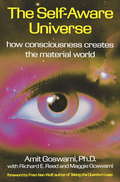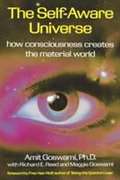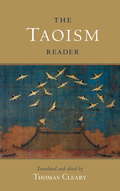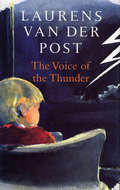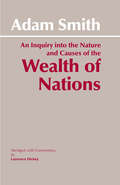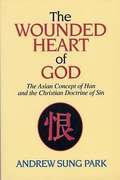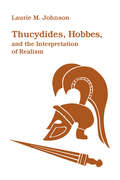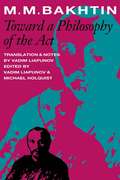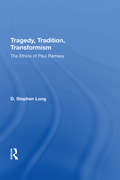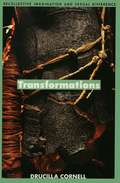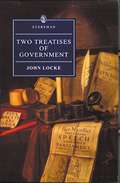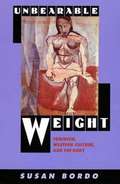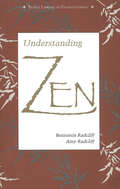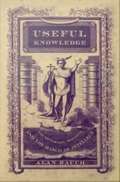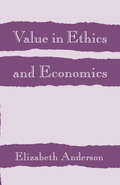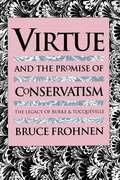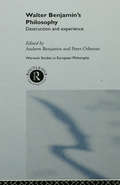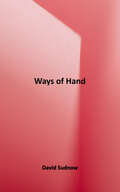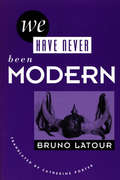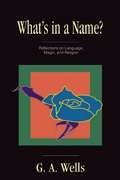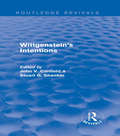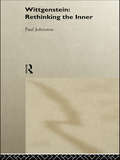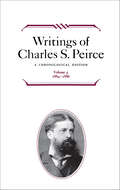- Table View
- List View
The Self-Aware Universe
by Amit GoswamiConsciousness, not matter, is the ground of all existence, declares University of Oregon physicist Goswami, echoing the mystic sages of his native India. He holds that the universe is self-aware, and that consciousness creates the physical world.
The Self-Aware Universe: How Consciousness Creates the Material World
by Amit Goswami Richard E. Reed Maggie GoswamiBrings together the most recent discoveries in quantum physics and provides a powerful argument for transforming not only the way we view nature, but also how we view our own personal reality. This book challenges readers to give up their prejudices regarding material realism, to open ourselves up to the new language and new concepts that have paralleled the growth of quantum physics, and to accept the revelation that an object and the thought of an object are both products of consciousness.
The Taoism Reader
by Thomas ClearyFrom the time of its earliest sages in prehistoric China, Taoism has looked to the underlying Way of all things (the Tao) as a guide to thoughts and actions. For the Taoists, the patterns of nature revealed the answers to their deepest spiritual questions and provided the inspiration for their unique teachings. Over the centuries, Taoism has blossomed into a profound tradition with a variety of forms--all united by a single, core philosophy of radical simplicity and natural living. Today, Taoism is most widely known through the Tao-te Ching, yet its corpus of literature is vast--ranging from philosophical dialogues and essays to astonishing fables, legends, proverbs, and more. This compact collection of Taoism's greatest masterpieces introduces its most fundamental teachings and reveals the essential spirit of Tao. The Taoism Reader includes: * Tao-te Ching: the foundational source of Taoist thought by the legendary Lao Tzu * Chuang-tzu: philosophical dialogues from one of Taoism's most famous sages * Huai-nan-tzu: teachings from the time of the Han dynasty on affairs of state, natural science, and Taoist psychology * Wen-tzu: records of further sayings by Lao Tzu on the art of living * Tales of Inner Meaning: fables, stories, and jokes from the Lieh-tzu and others on the subtleties of Taoist philosophy * Sayings of Ancestor Lü: teachings from Lü Yen, a seminal figure in the founding of the Complete Reality school of Taoism and master synthesizer of China's classic spiritual traditions
The Voice of the Thunder
by Sir Laurens Van Der PostFrom the beginning, Lauren Van Der Post has been aware of a dimension in life far longer and more significant than the outer eventfulness of everyday living. His perception of life's mysterious power began with the Bushman, the first people of his native Africa, and grew in the universal imagery of dreams, the fertile legends and stories of ancient civilization, the intuitive teaching of prophets, poets and other pioneers of human awareness. In this book he has brought together two of his most deeply felt and far reaching essays, and has extended their message with great imaginative insight, exploring the potential in all men and women to acquire self-knowledge and to live life according to its fundamental precepts.
The Wealth of Nations: An Inquiry Into The Nature And Causes Of The Wealth Of Nations (Hackett Classics)
by Adam Smith Laurence DickeyThis thoughtful new abridgment is enriched by the brilliant commentary which accompanies it. In it, Laurence Dickey argues that the Wealth of Nations contains--and conceals--a great deal of how Smith actually thought a commercial society works. Guided by his conviction that the so-called Adam Smith Problem--the relationship between ethics and economics in Smith's thinking--is a core element in the argument of the work itself, Dickey's commentary focuses on the devices Smith uses to ground his economics in broadly ethical and social categories. An unparalleled guide to an often difficult and perplexing work.
The Wounded Heart of God
by Andrew S. ParkPark asserts that one cannot grasp the full meaning of the sin and guilt of sinners until one has looked at the Korean concept of han--the relational consequence of sin--and shame of their victims. To reconcile with God and with other humans, one's sin must be repented, guilt must be forgiven, the han of those who have been wronged must be healed, and the shame which results from that wrong must be erased.
Thucydides, Hobbes, and the Interpretation of Realism
by Laurie M. JohnsonThis original book has been consistently cited by scholars of international relations who explore the roots of realism in Thucydides's history and the political philosophy of Thomas Hobbes. While acknowledging that neither thinker fits perfectly within the confines of international relations realism, Laurie M. Johnson proposes Hobbes's philosophy is more closely aligned with it than Thucydides's.
Toward a Philosophy of the Act
by M. M. Bakhtin Michael Holquist Vadim LiapunovRescued in 1972 from a storeroom in which rats and seeping water had severely damaged the fifty-year-old manuscript, this text is the earliest major work (1919-1921) of the great Russian philosopher M. M. Bakhtin. Toward a Philosophy of the Act contains the first occurrences of themes that occupied Bakhtin throughout his long career. The topics of authoring, responsibility, self and other, the moral significance of "outsideness," participatory thinking, the implications for the individual subject of having "no-alibi in existence," the difference between the world as experienced in actions and the world as represented in discourse--all are broached here in the heat of discovery. This is the "heart of the heart" of Bakhtin, the center of the dialogue between being and language, the world and mind, "the given" and "the created" that forms the core of Bakhtin's distinctive dialogism.A special feature of this work is Bakhtin's struggle with the philosophy of Immanuel Kant. Put very simply, this text is an attempt to go beyond Kant's formulation of the ethical imperative. mci will be important for scholars across the humanities as they grapple with the increasingly vexed relationship between aesthetics and ethics.
Tragedy, Tradition, Transformism: The Ethics Of Paul Ramsey (Springboard Lvls 09-16 A Ser.)
by D. Stephen LongIn this original interpretation and critique of Paul Ramsey’s ethical thought, D. Stephen Long traces the development of one of the mid-twentieth century’s most important and controversial religious social thinkers. Long examines Ramsey’s early liberal idealism as well as later influences on his work, including the just war doctrine, Reinhold Niebu
Transformations: Recollective Imagination and Sexual Difference (Just Ideas Ser.)
by Drucilla CornellIn a unique rethinking of political transformation, Drucilla Cornell argues for the crucial role of psychoanalysis in social theory in voicing connection between our constitution as gendered subjects and social and political change.
Two Treatises of Government
by John Locke Mark GoldieThis is the first modernized edition of the Two Treatises based on Locke's own corrected text as he left it for posterity at his death. Includes introduction, chronology of Locke's life and times, extensive glossary and key word index.
Unbearable Weight: Feminism, Western Culture, and the Body
by Susan BordoFantastic study of women and their bodies. This 10th anniversary edition has a new preface by the author plus a foreword by Leslie Haywood, feminist scholar superstar, an authority on women athletes and body builders. When originally published in 1993, it made the list of NYT Notable Books of the Year.
Understanding Zen
by Benjamin Radcliff Amy Radcliff"The authors of this book, who both have university affiliations, present Zen as a "secular doctrine without any necessary relationship to Buddhism or Eastern culture." Some of the seven chapters deal with such concepts as reason, paradox, meaning, and existence and how they relate to Zen. Others explore successfully the origin of Zen, the practice of meditation, and the social implications of Zen. The authors also investigate the Taoist and Buddhist ideas preceding Zen and relate it to Freudian psychology, anarchism, and the dualistic truths of the scientific method. Though this well-done study is accessible to informed lay readers, it is more suitable for academic libraries."--Library Journal
Understanding Zen
by Benjamin Radcliff Amy Radcliff"The authors of this book, who both have university affiliations, present Zen as a "secular doctrine without any necessary relationship to Buddhism or Eastern culture." Some of the seven chapters deal with such concepts as reason, paradox, meaning, and existence and how they relate to Zen. Others explore successfully the origin of Zen, the practice of meditation, and the social implications of Zen. The authors also investigate the Taoist and Buddhist ideas preceding Zen and relate it to Freudian psychology, anarchism, and the dualistic truths of the scientific method. Though this well-done study is accessible to informed lay readers, it is more suitable for academic libraries."--Library Journal
Useful Knowledge: The Victorians, Morality, and The March of Intellect
by Alan RauchNineteenth-century England witnessed an unprecedented increase in the number of publications and institutions devoted to the creation and the dissemination of knowledge: encyclopedias, scientific periodicals, instruction manuals, scientific societies, children's literature, mechanics' institutes, museums of natural history, and lending libraries. In Useful Knowledge Alan Rauch presents a social, cultural, and literary history of this new knowledge industry and traces its relationships within nineteenth-century literature, ending with its eventual confrontation with Charles Darwin's Origin of Species. Rauch discusses both the influence and the ideology of knowledge in terms of how it affected nineteenth-century anxieties about moral responsibility and religious beliefs. Drawing on a wide array of literary, scientific, and popular works of the period, the book focusses on the growing importance of scientific knowledge and its impact on Victorian culture. From discussions of Jane Webb Loudon's The Mummy! and Mary Shelley's Frankenstein, to Charlotte Bront's The Professor, Charles Kingsley's Alton Locke, and George Eliot's Mill on the Floss, Rauch paints a fascinating picture of nineteenth-century culture and addresses issues related to the proliferation of knowledge and the moral issues of this time period. Useful Knowledge touches on social and cultural anxieties that offer both historical and contemporary insights on our ongoing preoccupation with knowledge. Useful Knowledge will appeal to readers interested in nineteenth century history, literature, culture, the mediation of knowledge, and the history of science.
Value in Ethics and Economics
by Elizabeth AndersonElizabeth Anderson offers a new theory of value and rationality that rejects cost-benefit analysis in our social lives and in our ethical theories. This account of the plurality of values thus offers a new approach, beyond welfare economics and traditional theories of justice, for assessing the ethical limitations of the market. In this light, Anderson discusses several contemporary controversies involving the proper scope of the market, including commercial surrogate motherhood, privatization of public services, and the application of cost-benefit analysis to issues of environmental protection.Table of Contents: Preface 1. A Pluralist Theory of Value A Rational Attitude Theory of Value Ideals and Self-Assessment How Goods Differ in Kind (I): Different Modes of Valuation How Goods Differ in Kind (II): Social Relations of Realization 2. An Expressive Theory of Rational Action Value and Rational Action The Framing of Decisions The Extrinsic Value of States of Affairs Consequentialism Practical Reason and the Unity of the Self 3. Pluralism and Incommensurable Goods The Advantages of Consequentialism A Pragmatic Theory of Comparative Value Judgments Incommensurable Goods Rational Choice among Incommensurable Goods 4. Self-Understanding, the Hierarchy of Values, and Moral Constraints The Test of Self-Understanding The Hierarchy of Values Agent-Centered Restrictions Hybrid Consequentialism A Self-Effacing Theory of Practical Reason? 5. Criticism, Justification, and Common Sense A Pragmatic Account of Objectivity The Thick Conceptual Structure of the Space of Reasons How Common Sense Can Be Self-Critical Why We Should Ignore Skeptical Challenges to Common Sense 6. Monistic Theories of Value Monism Moore's Aesthetic Monism Hedonism Rational Desire Theory 7. The Ethical Limitations of the Market Pluralism, Freedom, and Liberal Politics The Ideals and Social Relations of the Modern Market Civil Society and the Market Personal Relations and the Market Political Goods and the Market The Limitations of Market Ideologies 8. Is Women's Labor a Commodity? The Case of Commercial Surrogate Motherhood Children as Commodities Women's Labor as a Commodity Contract Pregnancy and the Status of Women Contract Pregnancy, Freedom, and the Law 9. Cost-Benefit Analysis, Safety, and Environmental Quality Cost-Benefit Analysis as a Form of Commodification Autonomy, Labor Markets, and the Value of Life Citizens, Consumers, and the Value of the Environment Toward Democratic Alternatives to Cost-Benefit Analysis Conclusion Notes References Index Reviews of this book: Anderson is anxious to combat what she sees as a tendency for commercial values to invade areas of human life where they do not belong...A useful contribution to debate about the proper scope of the market. "Not everything is a commodity, insists Anderson, and her brief should shake up social science technocrats." --Philadelphia Inquirer "The book is rich in both argument and application." --Alan Hamlin, Times Higher Education Supplement "In this rich and insightful book Elizabeth Anderson develops an original account of value and rational action and then employs this account to address the pragmatic political question of what the proper range of the market should be. Anderson's principal targets are consequentialism, monism and the crude 'economistic' reasoning which underpins much contemporary social policy...This is an important book...For anyone interested in political philosophy this is essential reading." --A. J. Walsh, Australasian Journal of Philosophy--Hugo Dixon, Financial Times [UK]Reviews of this book: Not everything is a commodity, insi
Varieties of Moral Personality: Ethics and Psychological Realism
by Owen FlanaganOwen Flanagan argues in this book for a more psychologically realistic ethical reflection and spells out the ways in which psychology can enrich moral philosophy. Beginning with a discussion of such “moral saints” as Gandhi, Mother Teresa, and Oskar Schindler, Flanagan charts a middle course between an ethics that is too realistic and socially parochial and one that is too idealistic, giving no weight to our natures.
Virtue And The Promise Of Conservatism: The Legacy Of Burke And Tocqueville
by Bruce FrohnenOften loud and acrimonious, the public tug-of-war between a reinvigorated conservatism and a liberalism in apparent disarray has obscured an equally important competition-that among conservatives themselves. <p><p> In Virtue and the Promise of Conservatism, Bruce Frohnen joins the fray in an effort to rescue the essence of conservative virtue from rationalists and materialists of whatever political stripe. He argues that we have "lost and must attempt to regain the conservative good life and the outlook which made it possible." The tools needed to do that, according to Frohnen, are humility and—yes—political action aimed at combatting the centralizing and materialistic structures and beliefs interfering with the formation and retention of family, church, and neighborhood. <p> Drawing deeply from the writings of Edmund Burke and Alexis de Tocqueville, both critics of untempered reason and "the drive toward a spiritually impoverished egalitarian materialism," Frohnen explores how their work has influenced individuals as diverse as traditionalist Russell Kirk, "apocalyptic" libertarian Michael Oakeshott, and neoconservative Irving Kristol. <p> While differing greatly in their views and prescriptions, these contemporary conservatives, Frohnen shows, are nevertheless united in their desire to preserve the local community's natural and fundamental institutions. This preservation, he argues, requires a renewed faith in and humble acceptance of the essential good contained within these institutions.
Walter Benjamin's Philosophy: Destruction and Experience (Warwick Studies in European Philosophy)
by Peter Osborne Andrew BenjaminThis collection explores, in Adorno's description, `philosophy directed against philosophy'. The essays cover all aspects of Benjamin's writings, from his early work in the philosophy of art and language, through to the concept of history. The experience of time and the destruction of false continuity are identified as the key themes in Benjamin's understanding of history.
Ways of the Hand: The Organization of Improvised Conduct
by David SudnowThis is David Sudnow's classic account of how his hands learned to improvise jazz on the piano. David Sudnow is the author of Passing On and editor of Studies in Social Interaction. Since writing this book, he has developed a piano training method based on its insights.
We Have Never Been Modern
by Bruno LatourWith the rise of science, we moderns believe, the world changed irrevocably, separating us forever from our primitive, premodern ancestors. But if we were to let go of this fond conviction, Bruno Latour asks, what would the world look like? His book, an anthropology of science, shows us how much of modernity is actually a matter of faith. What does it mean to be modern? What difference does the scientific method make? The difference, Latour explains, is in our careful distinctions between nature and society, between human and thing, distinctions that our benighted ancestors, in their world of alchemy, astrology, and phrenology, never made. But alongside this purifying practice that defines modernity, there exists another seemingly contrary one: the construction of systems that mix politics, science, technology, and nature. The ozone debate is such a hybrid, in Latour's analysis, as are global warming, deforestation, even the idea of black holes. As these hybrids proliferate, the prospect of keeping nature and culture in their separate mental chambers becomes overwhelming--and rather than try, Latour suggests, we should rethink our distinctions, rethink the definition and constitution of modernity itself. His book offers a new explanation of science that finally recognizes the connections between nature and culture--and so, between our culture and others, past and present. Nothing short of a reworking of our mental landscape. We Have Never Been Modern blurs the boundaries among science, the humanities, and the social sciences to enhance understanding on all sides. A summation of the work of one of the most influential and provocative interpreters of science, it aims at saving what is good and valuable in modernity and replacing the rest with a broader, fairer, and finer sense of possibility.
What's in a Name?
by George Albert Wells"Using his probing intelligence to criticize the views of pundits from Locke to Chomsky, from Ayer to religious apologists, G. A. Wells has produced a lively essay on the persistent mistakes that have been made in understanding the relations among things, words, and ideas. The chapter entitled 'Language and the Bible' is a gem. It should delight skeptics even as it challenges believers. What's in a Name? shows, as if it still needed to be shown, that Wells is one of the foremost religious critics of our time."--Michael Martin Professor of Philosophy, Boston University
Wittgenstein's Intentions (Routledge Revivals)
by Stuart G. Shanker John V. CanfieldWittgenstein’s Intentions, first published in 1993, presents a series of essays dedicated to the great Wittgenstein exegete John Hunter. The problematic topics discussed are identified not only by Wittgenstein’s own philosophical writings, but also by contemporary scholarship: areas of ambiguity, perhaps even confusion, as well as issues which the father of analytic philosophy did not himself address. The difficulties involved in speaking cogently about religious belief, suspicion, consciousness, the nature of the will, the coincidence of our thoughts with reality, and transfinite numbers are all investigated, as well as a variety of other intriguing questions: why can’t a baby pretend to smile? How do I know what I was going to say? Wittgenstein’s Intentions is an invaluable resource for students of Wittgenstein as well as scholars, and opens up a wide horizon of philosophical questioning for those as yet unfamiliar with this style of reasoning.
Wittgenstein: Rethinking The Inner
by Paul Johnston Dr Paul JohnstonThe idea of the Inner is central to our concept of a person and yet is far from being philosophically understood. This book offers a comprehensive account of Wittgenstein's work on the subject and presents a forceful challenge to contemporary views. Written in a non-technical and accessible style, it throws new light both on Wittgenstein's work and on the problem of the Inner self.
Writings of Charles S. Peirce: A Chronological Edition (Writings of Charles S. Peirce)
by Charles S. Peirce"Highly recommended." —Choice" . . . an important event for the world of philosophy. For the first time we have available in an intelligible form the writings of one of the greatest philosophers of the past hundred years." —The Times Literary SupplementVolume 5 of this landmark edition covers an important transition in Peirce's life, marked by a rekindled enthusiasm for speculative philosophy. The writings include essays relating to his all-embracing theory of categories as well as papers on logic and mathematics.
